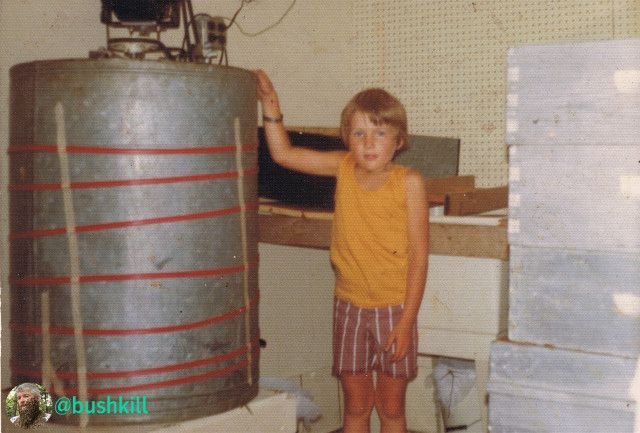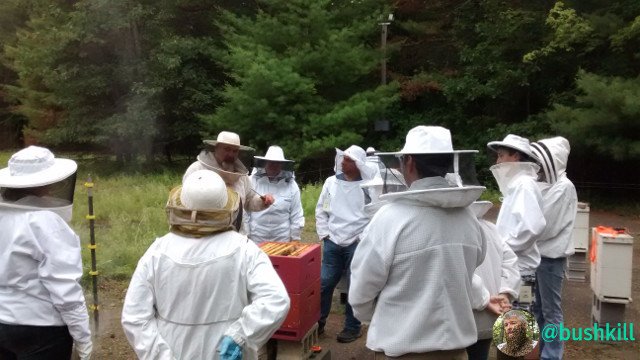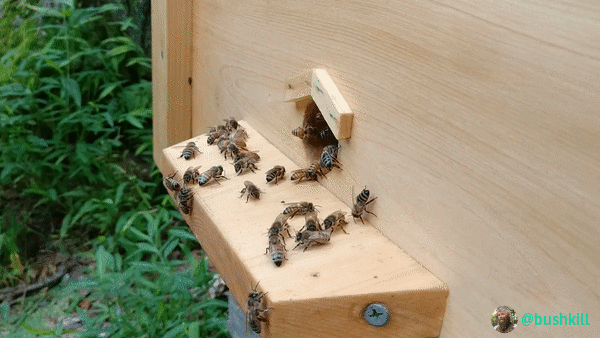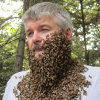I'm going to start a series of posts on "Beekeeping for Everyone!" and we will so how it goes. The idea is to give those that are interested in learning about beekeeping the opportunity to experience as much as possible without actually being in a beehive. My teaching up until now has been geared towards people who wanted to have bees of their own and proactively signed up and attended my classes.
I think this forum provides a unique opportunity to reach a whole new group of people. Those that may be fascinated by the amazing honeybee but never had the desire to have bees of their own or it is not practical in their current situation. Educating people about the honeybee has much benefit, even if they have no desire or ability to keep bees of their own.
This post is to judge the amount of interest and to discuss my thoughts on the possibilities.
A Little About Me
I have been "involved" in beekeeping for over 40 years. Started as youngster helping my dad extract honey. He had around 100 hives. By the time I was in high school I had my own hives and selling the honey through a farmers market in NYC.

My beekeeping stopped when I went off to college. After settling in to my career, getting married, and buying a house, I got the beekeeping urge again. It was around the time that varroa mites became an issue in the US. With a full time job and other time consuming hobbies, I had no desire for a large scale operation. Instead I settled for just a couple hives and focused on the best way to keep them strong and healthy. I was a regular participant in beekeeping mail lists discussing the new issues bees where facing. In 2002 I started my first beekeeping website and in 2004 was one of the founders of Beemaster.com, the largest beekeeping forum dedicated to hobbyist beekeepers that is still going strong to this day. A few year later I started teaching free yearly introduction courses at local libraries. In more recent times, I am a founding member of Hudson Valley Bee Improvement and an instructor for their season long hands-on learning course.
Where to Start
There are a lot of online courses and eBooks available about beekeeping. There are some good ones and there are also some not so good ones. There seems to be a market for beekeeping and wherever there is a market, there are people trying to capitalize from it. I see so many eBooks and websites run buy people with less than 5 years experience and now they are the "experts".
Obviously it takes more to be a neuroscience expert than say a yoga expert, but a good generally accepted ballpark is 10,000 hours. A good article on this can be found at Barking Up the Wrong Tree where there is a discussion with Anders Ericsson, the professor of psychology that created the theory. I'll refer to some of his conversation later on.

So with this in mind, it would take 5 years of working full time (40 hours/week) to meet the 10,000 hours. Since most of these "less than 5 years" experts are just hobbyist, you are looking at 12 years or more assuming 16 hours a week. These numbers don't even take into consideration that beekeeping is a seasonal activity and in most locations there are months when the bees are left undisturbed. It is safe to say that most hobbyist spend less than 40 hours a year hands-on in a hive.
I've been doing this a very long time and continue to learn more about honeybees almost everyday. Although I may have the 10,000 hours of experience I do not consider myself an "expert". However, I do have a wealth of knowledge and experience to share.
Be a Critical Thinker
My first comments to every class I teach is to explain that I'm not here to tell you what to do. There is not just one right way to keep bees. Don't do something that I or any other beekeeper tells you to do unless you understand WHY you are doing it, and it MAKES SENSE to you. This goes for what you read in books as well. There is a wealth of knowledge available in books, but for the most part, they walk you through the normal or ideal situations. You will soon find that nothing ever goes the normal route. Furthermore, the bees haven't read the books, so they don't always do "what they are suppose to" !

image credit: Pixabay
Mentors
Ericsson explains that it is not just doing the same thing over and over again that makes you an expert. The first step is to find a mentor. I have been very fortunate to have, and had, excellent mentors over the years. Each had a unique take on beekeeping and all have provided input to my style of beekeeping. However, the mentor I rely on the most is the feral honeybee. I have spent countless hours saving wild colonies that needed to be relocated as well as observing wild colonies in situ. Some things that I have observed are in complete contradiction to the "Acceptable" beekeeping practices that have been passed down for decades. I often catch flack from other beekeepers for questioning these "standards". I will share my views going forward and the rationale behind it. You just need to be that "critical thinker" I encouraged above.

Format
There are many ways this can go. I going to start with short topics in written posts. I use to teach a 2 day introduction class that was so jam packed that we struggled to finish within the two allotted 6 hour sessions. A few years ago I came to the realization that it may have been too overwhelming for folks, so I took it up a level and condensed down to one day. That seems to give folks enough knowledge to feel comfortable and allows them to then progress at their own speed.
We have no time constraints here, so there is no need to rush through the information or skip the details. But I do realize folks have a finite amount of time they can invest during a given week. My goal is to keep each 'lesson' short enough that one can easily read and digest the information in a reasonable amount of time. I also hope to be able to post a 'lesson' every week, but I'm sure there will be times when it may take a little longer due to life events. I also understand the value of photos when teaching and will do my best to use them often.
I'm going to do some experimenting with voice-over narration of my PowerPoint presentations to see if that may be an option as well.
Currently winter here, but once spring arrives the plan is to video record some hands-on sessions in the bee yard inspecting hives. I don't have much video experience, but will figure out the logistics of doing it solo.

Feedback
Feedback is key and I value your input. I often find myself unintentionally taking things for granted because I have been doing it for so long. So don't hesitate to ask questions. Feel free to leave your thoughts/suggestions.
Spread the Word
I'm new to the platform so would appreciate any help getting the word out about this effort. So please pass this on to anyone that you know that might be interested. And of course, even if you don't have anyone in mind, resteeming is always appreciated.
Also, check out my other posts on beekeeping, I'm sure you will find them interesting. Especially my one on bee beards.
I have two local classes coming up here soon in January and plan on promoting this effort to the class attendees in an attempt to get more people aware of Steemit.
Beekeep On!
@bushkill

